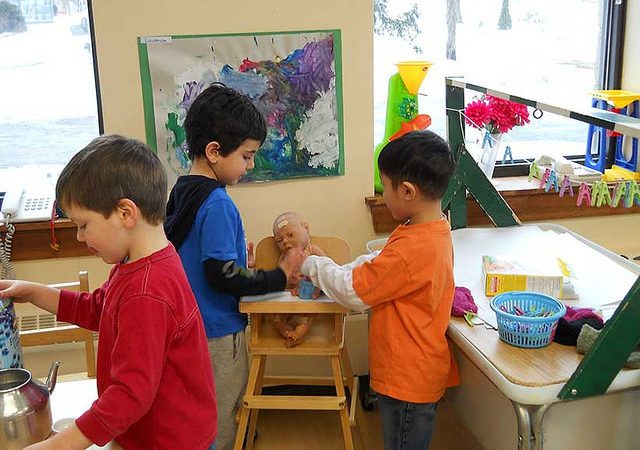
What does good early years education look like? A Q&A with Sandra Mathers
Sandra Mathers of the University of Oxford Department of Education joined us last week to talk about quality in nurseries and pre-schools. Sandra has a background in primary teaching and her research is focussed on improving local and national education policy.
Image: Vanier College CC BY-NC-ND 2.0
Q: When parents think about education in nurseries, they are often thinking about starting to learn about reading and writing. Is that what your research is referring to, or is it a broader set of activities?
Sandra: Yes, much broader than this. My work is about supporting all areas of children’s development – so that they are good readers and writers later on but also so that they are good all-round learners for life.
PSG A: Could you give us some examples of what areas of provision a nursery would have to demonstrate good practice in in order to be seen as providing a good education?
Sandra: There are many areas, but once you take account of things that must be in place like health and safety, the most important thing is to have high quality adult-child interactions.
PSG A: That figures! How do you go about measuring those interactions in order to judge whether a nursery is good or not?
Sandra: Good question! Well of course you can look at the Ofsted report, but as a parent I would also always recommend visiting for yourself and spending some time at a nursery.
When I do my research, I use an observational framework that helps us to tune in to evidence-based practices and whether these are in place within the nursery.
Q: Do you think that there is too much emphasis on getting kids ready for “big school” in a pre-school setting – getting them to sit still for extended periods of time and regurgitating art work and the days of the week? Free play is hugely underrated I feel.
Sandra: I agree. I think that schools should be ready for children as well as the other way round. Children learn best when they are interested and engaged which is not necessarily sitting still for a long time 🙂
PSG C: I am leaning toward home educating because it seems 4/5 is so early for being apart from the primary carer for such a long time.
Sandra: I don’t know very much about home educating I’m afraid. Is there an option for your child to begin reception part time?
PSG C: She attends nursery 2×3 hours a week, but that was the minimum they’d allow as I was studying but will stop at 5 years old.
Q: Is there any research into the advantages and disadvantages of a child attending one setting compared to attending two different setting with different emphasises?
Sandra: That’s a really interesting question. I think it depends what you are looking for.
What would be important is to manage the transition between the two and to make sure that children were in each setting for long enough to feel stable and secure.
Q: How important do you think it is for young children to be taught by an equal mix of men and women?
Sandra: I don’t know of any specific research but in general I think that it is important to have men as well as women working with young children.
PSG F: Thank you. For what reasons?
Sandra: This is my personal opinion now rather than research evidence, but I think that it is important for children to have male and female role models, and to have men caring for them as well as women.
Q: Lots of nurseries seem to advocate a very brief settling-in period (with the parent present) and then parents are expected to leave the child there, even if they’re crying/distressed etc. I’m just wondering if there is any research that supports this approach?
Sandra: There is a lot of good evidence that children need to feel secure and settled in order to learn.
I don’t think that there is specific research that I know of about the length of a settling-in period but I would say that any good nursery should be interested in your child as an individual, talking with you about how they are settling and willing to be flexible when children are obviously finding settling difficult.
Q: What are the best ages for children to socialise with at nursery in order to learn best?
Sandra: In general the benefits of going to nursery for social skills seem to begin from around 2 years of age.
PSG E: Is there a specific benefit to attending nursery over socialising in different settings (eg toddler groups, baby/toddler classes, with friends etc)? And is there a benefit to interacting with a group of peers of the same age over and above mixed age group socialising.
Sandra: This is a really interesting question! And I’m not sure I know the answer, actually 🙂
PSG H: When younger children go to nursery, is there any evidence to suggest they should be in a mixed age group to learn and socialise best?
Sandra: I know some very good settings that operate family groupings, so mixing ages of children. But I think that it can be harder to meet individual needs sometimes. So for example, to pitch your language at the right level for all children (simple enough for the little ones but also providing new and challenging vocabulary for the older ones). It’s possible…but needs a really skilled practitioner to do this well. Or parent, of course! This is the context in the home for most families 🙂
PSG E: We home educated for a couple of years and my anecdotal observations of that was that babies and toddlers thrived in the large group settings (age 0 – 18 and adults ). I am really interested to know more about age mixing not just for preschool but also for primary and secondary education. My middle two attend a very small primary school so there is a lot of mixing between the years (and the nursery is included in some of the mixing too) which is amazing to see and for me a much more positive experience than the bigger school my oldest two went to before we home educated.
PSG F: Anecdotally it worked for my son.
PSG A: I’m really interested in this, as I’ve read a lot recently about primary schools being discouraged to use any ability setting in their classrooms, but to teach the whole class as a mixed ability group. Yet, simultaneously there seems to be discouragement to teach groups of mixed ages.
PSG I: I would think that mixed ages can be very effective in small groups but not in the large class sizes that are needed for our state education system to be economically viable.
Q: When it comes to staff to child ratios in nursery, how are these guidelines tested? My wording is a bit poor here – I guess I’m thinking how do we know what benefits the child best for learning and play when it comes to 1:1 time with an adult and other children?
Sandra: Research on ratios generally supports the idea that fewer staff per child is a good thing (higher quality interactions, children do better), but it is hard to pin down an exact threshold.
The effects/benefits of favourable ratios tend to be stronger for younger children – so for babies and children under three, its really important. Its important for older ones as well but the ratios can be a little higher.
PSG I: Do you know how the ratio for 3 year olds was established as 1:13? It seems such an oddly specific number (why not 12?!) as well as being twice as high as the ratio for 2 year olds.
Sandra: You are right, the evidence on ratios does not give us such a specific number. I’m actually not sure how the number was chosen.
Q: I’m very interested in your research ? I wonder whether there is any evidence on comparing kids that went to nursery and those who didn’t on their social skills/readiness to start reception?
Sandra: Yes, there is a lot of good research about the benefits of nursery provision – for social development and for learning. The EPPSE study in this country followed around 3,000 children from age 3 to the end of secondary school and beyond, and there were benefits all the way up to that age of having attended preschool. But the benefits are strongest when preschools are of good quality.
PSG I: I seem to remember (very vaguely) that when the EPPSE study was published, there were some questions about the criteria they used. As in, criteria were looking for academic development, but psychological factors (attachment, confidence etc) were not studied.
Sandra: They also looked at social development as well – their independence, concentration, social skills, self-regulation. Many aspects as well as academic learning. But you should always be critical of any research study and ask questions about the methodology 🙂
PSG I: Thanks, perhaps I was remembering a different study.
PSG Q: The EPPSE study showed that only the best nurseries improved outcomes for children. Does your research concur with this?
Sandra: In general, research does suggest some general benefits of preschool provision, but the strongest evidence is definitely for high quality.
Q: My 3 year old is showing interest in numbers, letters and reading. Is there any disadvantage to encouraging this so early? I’m aware he’ll get plenty of opportunity for these things at school. He’s in a Montessori nursery 3 days and one day each with us.
Sandra: I think that it’s good to follow your son’s interests but that you can do this in a very natural way. So maybe maths while you are cooking at home with him, that kind of thing.
Sharing books with children is really important and one of the best things that adults can do – at home and in the nursery. When adults read book to and with children, this means children can access books (and language) much more complex than they could read by themselves, so you are providing a great language model and helping him to be excited by books and stories. This will be just as important in helping him be a good reader later as working on his letters and sounds at age 3.
PSG L: Thank you, that’s really helpful.
Q: There seems to be quite a bit of regulation and policy around early years education – staffing ratios, EYFS curricula, schooling starting age, etc. But how much of that is based on actual evidence? How are those decisions made? Is it evidence-based, or is it political?
Sandra: This is a very interesting question! The EYFS is a good evidence-based document (you can read about some of the evidence here: http://lx.iriss.org.uk/content/early-years-learning-and-development-literature-review) and ratios have also pretty much been set according to what research evidence tells us.
School starting age is a much harder question and – as you know – countries really have different approaches to this.
Politics also of course plays a role 🙂
Q: I was really interested in your research that found that nurseries in disadvantaged areas often demonstrated lower quality. What aspects of quality were lower and why do you think this was?
Sandra: The aspects which were lower were mainly around support for children’s language and learning, which is worrying as these are really important to get right. We found some evidence that the gap between nurseries in disadvantaged and more advantaged areas was less when nurseries had a graduate member of staff. So staff qualifications are important.
PSG A: Did the staff who were graduates always have degrees in early childhood education? And did you do more detailed analysis about the increase in qualification level vs the quality of the nursery? I guess I’m wondering if it was the degree course content that was specifically linked to the increase in quality.
Does this suggest that the other qualifications have less helpful content or simply that people who study for longer have better skills?
It seems to me that that’s a lot of student debt to carry when your prospects for future pay are quite low.
Sandra: Yes, it was having a graduate that seemed to be most important. Other research suggests the same but in general most research will have looked in quite a broad way (did they have a graduate or not) rather than explore the effects of specific degree content. I think we need to understand much more about this – what makes a good degree?
I totally agree with you about pay for well qualified staff.
Q: Early years education providers have been traditionally low paid and not really viewed as a worthy viable career. Do you think this will ever change?
Sandra: I hope so. The early years are the most important to get right – they set the foundations for later learning. Young children should have the best qualified staff and for that, we need to pay them well and value the vitally important job that they do.
PSG B: As somebody currently studying early care and education, I hope so too! Thank you for taking the time to answer questions tonight.
Sandra: I wish you all the best with this, you will be making a huge difference to many children.
Q: Lots of children are reported to eat better at nursery than at home. We know there’s no research on why this is specifically, but in your experience why do you think this is? Do all nurseries adopt the same approach to mealtimes? Do they all adopt the same approach for supporting children who are “picky eaters”? Is this based on any evidence?
Sandra: I don’t know of any research in this area I’m afraid. The nurseries I know do take different approaches and I’m not sure I would say there is a ‘right way’. But they should all provide good food, support children in being independent and also make the most of mealtimes for learning and for conversation.
PSG I: Perhaps for the same reason that children are sometimes angels at nursery but little devils at home!
Q: So adult child ratios and opportunities for free play. Any other good practice we should look for when selecting a nursery?
Sandra: Really the interactions between adults and children are the most important thing, in my view. Apart from safety, this is why ratios matter, because it’s harder to have good quality interactions with more children. But then having well qualified staff is also important, as research tells us that they provide higher quality support for language, learning and development.
Having regulations like ratios and qualifications are all really ways of trying to make sure that children experience warm, supportive interactions that support their social and emotional development, their language skills and their learning.
PSG B: Hope it’s ok for me to add in that I’d also ask to look at their discipline policy/positive behaviour. For example. how do they handle disputes between children?
Sandra: I agree that support for children’s behaviour and for their interactions with peers is very important. In the best nurseries, staff are really skilled at anticipating any problems before they arise, so that disputes happen much less often.
Q: I’d be interested to know your views on both Bold Beginnings and this new baseline testing that’s planned for 5 yr olds.
Sandra: Bold Beginnings is an interesting issue! I think that there were some good points and some not so good in that report. I believe Ofsted is right that we need to look at reception classes but I don’t necessarily agree with their analysis of the problems and solutions. I think that reception classes have become very focused on literacy and maths progress and on testing children. We have lost sight in some ways of the whole child and their all-round development.
Q: How should nursery staff and parents play with kids – how much guiding, and how much just free play?
Sandra: The research evidence tells us that both adult guided learning and free play are important, children learn in both these contexts.
Q: Is there any research on how Children’s Centres (Surestart) help early education or school readiness?
Sandra: There was a good evaluation of Children’s Centres led by others in my department (Kathy Sylva, Pam Sammons). I believe what they found was that it was the early education provision in Children’s Centres that did the most to support children’s development.
Sandra provided us with these useful to links to relevant websites:
- The EPPSE (longitudinal research on the effect of schooling) website: http://www.ucl.ac.uk/ioe/research/featured-research/effective-pre-school-primary-secondary-education-project
- The evaluation of Children’s Centres: https://www.gov.uk/government/publications/childrens-centres-their-impact-on-children-and-families
- Summary of research on quality of early years provision for under threes: https://www.suttontrust.com/research-paper/sound-foundations-early-years/
- A couple of great TED Talks on language and reading with children:
- Evidence base behind the EYFS http://lx.iriss.org.uk/content/early-years-learning-and-development-literature-review
Inspired? Why not check out some of our other Q&A sessions? We’ve talked about
- Forest Schools with Sara Knight;
- Flexischooling with the Centre for Personalised Education;
- How boys and girls read with Sarah McGeown.
You can find the full list and links to all the sessions here: http://parentingsciencegang.org.uk/live-chats-with-the-experts/


